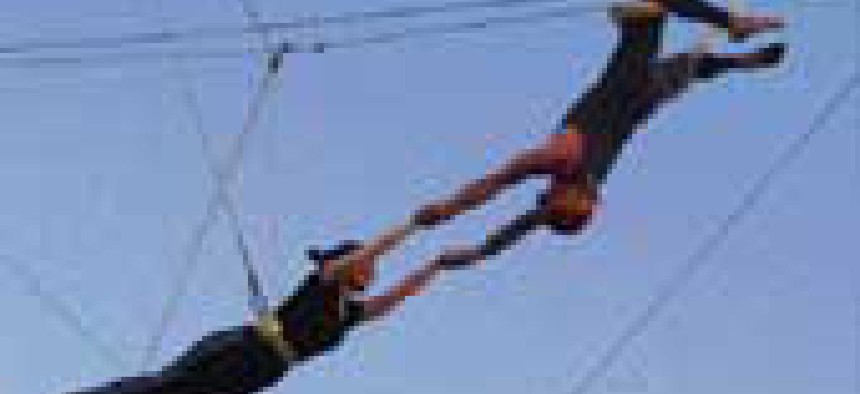Life lessons from the flying trapeze

A conversation with Brian McVicker, TSNY Baltimore president.
Sandwiched between a small marina and volleyball sand courts in Baltimore's Inner Harbor is a trapeze school called TSNY Baltimore. Students flock to the school to fulfill childhood dreams, experience excitement and get in shape.For the school's president, Brian McVicker, learning trapeze skills is as much about building confidence and sharpening focus as it is about having fun and getting an adrenaline rush.McVicker recently spoke with staff writer Doug Beizer about the school and the benefits of participating in activities far removed from one's professional life. It's an outdoor activity, and when you walk by it, it looks fun and exciting. Initially, people see it from far away, and they look at it and think, "Wow, that looks fun and exciting." That's the immediate draw. Very often it is just people thinking, "Wow, that looks like fun, and those aren't superheroes doing that. Those are ordinary people. So if it is good for them, it's good for me." We have people from all walks of life, from doctors to attorneys to schoolteachers ? you name it. There's not one stereotypical person who shows up for class. We have 7-year-old kids who think it is fun and exciting to do for a birthday party, and we have people in their 60s trying it for the very first time because they've dreamt about doing it since they saw it in the circus when they were children.We had someone two years ago who was blind. In three classes, I went up and caught him. He scaled a ladder that was 23 feet high, got on the platform, grabbed that bar and learned a trick. He flew across and made a catch and released that bar, and went away with the catcher. And did all of that in complete and total trust. When you learn something physical, like flying trapeze, it puts you in a place where you have to have total focus. And in the world in which we live, we have to multitask a lot. Trapeze brings you back to being able to solely focus on what is right there in the moment.My students come back and say, "My focus is definitely increased in the rest of my life. I am able to take one thing and stay right there in the moment and focus on that one thing." I have people training for triathlons come to us to learn how to focus in a little more and really dial into their bodies. Just the other day one of my students was definitely bothered by something. As soon as we got to the ground, I asked what was going on. I could see she was not fully there. And she told me she was worried about jellyfish spotted in the water where she was about to compete in a triathlon. I told her, "You can be fully focused here, on what it is you're doing and let go of that fear of the jelly fish for right now. Just let it go and let's address it later." By the end of class, she said, "I feel a lot better about my race this weekend." We run into that, especially with our younger clientele as far as video games go. I had a chance to talk to some kids about a month ago who obviously were immersed in gaming. They had their PlayStation portables with them, and they were playing games in between their turns on the trapeze.Their parents were telling them to put the games away. I said, "You know, not all of what they're doing is bad." They're learning mental agility and focus with the video games. Although it might seem that it's limiting them physically, those things can then be translated into the physical activities that we do.One of my employees is an information technology professional who works at a law firm. She does IT during the day, and then in the evening, she'll teach flying trapeze. She likes the way the two are different. If you find something that is truly your passion and then you can turn it into a business that would allow you to generate an income and employ others and do so successfully, then you really don't have to work a day in your life.If it is your passion, then you're going to be doing that anyway. You'll be doing it as a hobby and paying to do it, or you can be doing it as a business and get paid to do it.

WT: Why are people interested in learning the trapeze?
McVicker:
WT: What types of people come to the school?
McVicker:
WT: How can learning the trapeze help a person with the rest of his or her life?
McVicker:
WT: Does confidence on the trapeze lead to confidence in other areas?
McVicker:
WT: What kind of feedback do you get from people who are computer-oriented or really into video games?
McVicker:
WT: Running a trapeze school is fairly exotic. What advice do you have for people who want to launch a business that seems a little risky or different?
McVicker:

Trapeze School New York
WT: Why are people interested in learning the trapeze?
McVicker:
WT: What types of people come to the school?
McVicker:
WT: How can learning the trapeze help a person with the rest of his or her life?
McVicker:
WT: Does confidence on the trapeze lead to confidence in other areas?
McVicker:
WT: What kind of feedback do you get from people who are computer-oriented or really into video games?
McVicker:
WT: Running a trapeze school is fairly exotic. What advice do you have for people who want to launch a business that seems a little risky or different?
McVicker:
NEXT STORY: Bill Loomis | Large contracts offer boost